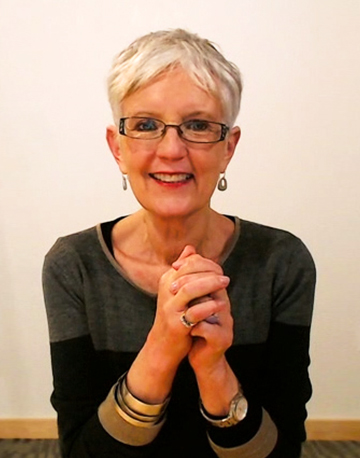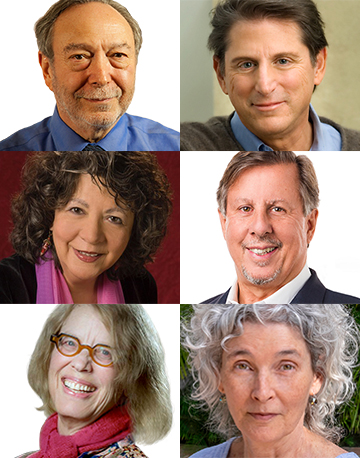How to Work with Patients Whose Trauma Triggers Problems in Their Current Relationships
 |
with Stephen Porges, PhD;
|
 |
with Stephen Porges, PhD; Terry Real, MSW, LICSW;
Janina Fisher, PhD Richard; Schwartz, PhD; Pat Ogden, PhD; Martha Sweezy, PhD, LICSW; Bessel van der Kolk, MD; Ruth Lanius, MD, PhD; Deb Dana, LCSW; Thema Bryant-Davis, PhD; Ruth Buczynski, PhD
Sign up for a Gold Membership

This is a learning community for practitioners. We can’t wait to hear what you’re going to use with your clients
But please do NOT:
- seek advice for personal problems
- ask for referrals
- post links or advertise a product
- post about technical problems
Hello, I am a little confused. I did pay for gold membership and c.e. hours. I am a counselor but also an artist, am just reopening my practice after 13 years off to study art. I will be aiming my practice at artists (who in some ways face unique, but yet universal, issues) and those who want to claim or reclaim their creativity in any way. During the month of December you can see a show I curated at The Arts Center in Corvallis, Oregon, called “How Do We Heal?” There are two half hour recordings in which I speak, show a great clip by Latosha Brown on this issue, and interview the showing artists on the question (more than the answer.) It is a question to live with daily, each in our own way.
I am really excited to work with this particular trauma program. It was brought to my attention in a formal way by an artist who works with it in his own practice with artists all over the world: Prem Krishnamurthy. Thank you for the truly great work you have all done on trauma. Essential work. Amy Isler Gibson (ArtistTherapy, not online yet but soon.) Instagram: amyclevelandart
I signed up. How come I keep on receiving messages to join?
I don’t quite understand how the seminar could make the point that the adaptive child can’t learn new skills, and yet in one presenter’s example, that 15 year old part was rather harshly told by the client that it could not rage at the client’s husband. There was no suggestion of how the 15 year old part, who had been severely abused, was to stop, and no reference to the fact that other presenters had stated that the adaptive child, usually a teenager, can’t learn new skills to begin with, so that trying to teach it new skills was not going to work.
I also must say that there was no mention of male sexual abuse by a mother, which is one of the primary forms of male sexual abuse I dealt with in representing abused children and their parents in a large city for many years. Both the form in which the mother starts physical sexual abuse when the boy is an infant, as well as when the mother uses the boy as a surrogate spouse, usually for comfort after abuse by the father or boyfriend. The second type, in my experience, often occurs when the boy is late pre-teen or early teen, and the mother will do things like get into bed with him, cry and hug him in the bed, and otherwise use him for comfort. Even if she does not make overt sexual moves toward him, he may be both aroused and ashamed, and also feel grateful for the attention and proud that he can help his mother against his father or the mother’s boyfriend. He may grow into adulthood thinking this is normal, and unaware of the ways in which it affects his adult intimate relationships. I was disappointed that these were not at all dealt with, or even mentioned. Especially given how common they are, abuse-wise.
Srishti
I am wondering after attending this exciting workshops if most of the difficulties in relations and a variety of psychological symptoms can be referred to trauma.
Thank you for this comprehensive conference.
Thank you.thoroughly enjoyed all the sessions.
Although we work with traumatised people daily there is always something new to learn ….the information shared by all the speakers is invaluable
Thank you Ruth for putting on these free sessions which has allowed people to attend who might otherwise of been unable to due to Covid.
I have valued the knowledge and will add these ideas to my toolbox. Having gone through my own journey of CPTSD I have recognised several things which have been highlighted here over the weeks as being part of my own journey, although at the time of going through them I didn’t realise they had a name. One thing that I will take away from this course is to share with clients the knowledge that there are reasons for why they act as they do and it is not the case that they are mad or bad as I once thought about myself. Reliving trauma can be harrowing and changing old scripts for new can take a long time and is perhaps forever ongoing. I hope that I will be able to apply my knowledge and in doing so let another feel a similar sense of peace as I do now.
The idea of responses being muscle memory really resonated. I’ve used that concept with clients twice today and it was very helpful.
I liked the idea of separating the 3 parts, and having the adult part speak for the wounded inner child, instead of having the adaptive child keep re-enacting defensive patterns. The 3 parts reminded me of the book, I’m Ok, You’re Ok which also spoke to this idea. I also liked the concept of Exiled Parts of Self. “Exiled” is a word with strong overtones of feeling. I like to think of a person as being a king or queen, who has the power to bring somebody [a power or quality] back from exile to their home country [the true self.]
I like many aspects of this presentation. One that stands out is the somatic aspect of asking the person what they think the other is feeling/thinking in relation to their body posture. Also, assessing for male sexual abuse, which I think goes unnoticed, esp. by male therapists. I also like how at the end, the session reintroduced how to work with the basics of freeze/collapse/please defenses.
I am a retired RN and have throughly enjoyed learning numerous techniques in dealing with trauma victims. Most of all in dealing with my 91 year old mother. I recently discovered that she suffered from a traumatic event in her childhood, I always knew she carries great shame and silence issues but didn’t know why; or how to deal with them. Your sessions have taught me to accept her shame, silence & her need to control everything as a genius way for her to deal with the trauma. These issues have been passed to her children and grandchildren in many ways. My mission is to try to heal what can be healed by befriending those “parts” of her and her family, for how they help us to move forward. I would absolutely purchase the Gold package if I could and thank you whole heartedly for your generosity in providing this series to so many lay and professional people as we attempt to heal those we can.
Thank you again for providing this as a potentially free service. It is very helpful at this time.
Professionally I have been trained in the field of Biobehavioral Health, This provided me with the tools that were important in setting up programs in rural communities where resources are limited and trying something outside of local culture very difficult for the community. I am also a survivor of sexual and physical trauma and had the good fortune to work with a therapist who introduced me to body work including yoga, chiropractic sessions as well as working with my inner child selves. My life became my own.
Over these last four years I have been triggered by the man who was elected president. My reactions to what was happening were PTSD repeats from my past, I am thankful that because of my therapy and training I have been conscious of what was going on and worked it. i have had many moments with clients, family and friends who have been triggered into PTSD states by this same man. There will be untold numbers of people who will need help going forward .
Right now in these post-election days I am thinking that those who supported Mr. Trump for reelection may have developed an even stronger attachment to the abusive environment we have lived with and they said yes, once again, because it is so familiar to their child selves. My adult self says this is destructive to their personal lives and continually traumatizing to the communities where they live. Child abuse untreated can draw us to authoritarian relationships that go beyond family or life partner. And there is a long history in this society of many levels of abuse that we now must own and hopefully begin to heal. The tools you can provide across many professions will provide a valuable contribution to this work.
Lorraine Whalen, I appreciate your insight. I think it’s extremely valuable and needs to be better understood by people in general. I’ve always sensed that voting behaviour wasn’t just about the economy or politics, but something more deeply imbedded in people’s psychological make-up. Your explanation of what that psychological make-up might be is compelling, given the behaviour patterns on both sides of the relationship, and seeing how the behaviours have unfolded over the last 4 years.
Lorraine Whalen and Tamara Harbar, your comments speak directly to 2 articles I was invited to write for psychiatrists and mental health practitioners on: Why there exists Trump supporters? Google my name, Suzette Misrachi, as I will put them on medium.com (2nd one about to be published end of Nov 2020) free for anyone. I’d be interested in receiving any feedback, critical or otherwise.
I watched your video yesterday and have just come from a session with a client. We’ve already worked with the inner damaged child and I just mentioned the pretend adult part who can affect our relationships. She jumped on the concept, saying yes that’s how I feel… I’m so thrilled that I’ve been able to leave her now having prayed a blessing on her teen adaptive child and let her hand over to the adult. I’m a Christian Counsellor and I thank you all for your amazing trauma course which has added so much to my practice
I feel grateful to have had this opportunity to attend this master program, I have often been curious about how Western practice interfaces with Indigenous healing practices. I have noticed language is an important factor. This comes from a sense I have about how Indigenous/First Nations practices tend to more experiential. I love how Vine Deloria puts it, basically saying; Western education today is about producing professionals and Indigenous practices is about producing people. I work with people using Ancestral ways and thought I had best learn how to express this in a language that might connect both together. I believe that our Ancestral knowledge can help to heal the implicit and explicit intergenerational patterns that have disrupted not only the Indigenous peoples, but all peoples. So again I say Haawa (thankyou).
I am in recovery for being an Adult Child of an Alcoholic. I would love to see these materials adapted for use with each other.
As a psychosynthesis coach working on Zoom these days, I have found that the distance with the Zoom room assists a client to feel more able to talk about their trauma and be more able to receive the feedback and let me know if there was a trigger felt by them. This series has assisted me in recognising more of the triggers and being more sensitive and gentle in managing them and asking questions to bring out the responses that may go unmentioned if not asked about. Many thanks for this rich course of valuable information.
I have gained greater understanding about the role of the ‘adaptive child’ from this session and it’s an easy concept to share with my client to help her understand why she behaves the way she does.
Very useful and thank you very much for the gift of this free webinar.
Ursula
Dublin
So good. Thank you all for allowing these teaching to be available. I have enjoyed and looked forward to each teaching. I love the I.F.S. theory of working with the different parts of self (speaking for opposed from that part).
Thank you Ruth for putting these summits together. I’m sorry I can’t afford the whole package this time, but I look forward to supporting you soon.
Erin Beeman, CMT, CST Vallejo CA
Great session for me today. I am training as a relationship therapist and these gems of information will add to my toolbox most profuoundly.